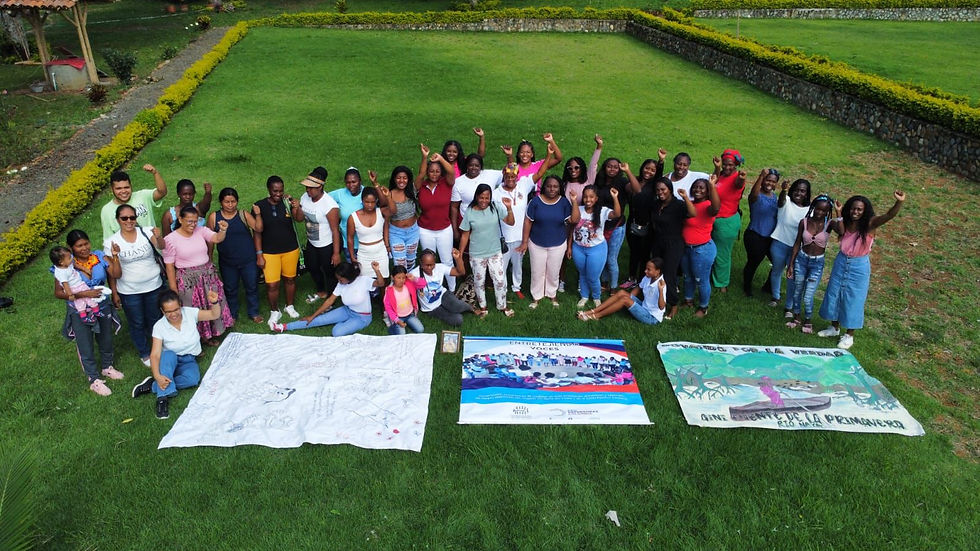Building Social Justice from the Territories: The Role of the United Nations Multi-Partner Trust Fund for Peace in Colombia
- Fondo Multidonante de Naciones Unidas
- Feb 20
- 4 min read
February 20 marks the World Day of Social Justice, a date that invites us to reflect on the importance of promoting equity, inclusion, and access to fundamental rights for all people. In Colombia, this day takes on special significance in the post-conflict context, where the construction of stable and lasting peace is intrinsically linked to social justice. In this scenario, the United Nations Multi-Partner Trust Fund for Peace in Colombia has played a key role by supporting initiatives that seek to transform the realities of communities most affected by armed conflict and exclusion.

Social Justice: A Fundamental Pillar for Peace
Social justice is not just an abstract concept; it is a necessary condition for achieving peace. According to data from the United Nations Development Programme (UNDP), Colombia is one of the most unequal countries in Latin America, with a Gini coefficient of 0.54 in 2022. This inequality is exacerbated in rural areas, where the armed conflict has left deep scars of poverty, lack of access to basic services, and social exclusion. For many communities, social justice means access to land, education, healthcare, and economic opportunities, as well as the ability to actively participate in decisions that affect their lives.
The United Nations Multi-Partner Trust Fund for Peace has recognized that social justice is an essential component of peacebuilding. Since its creation in 2016, the Fund has supported over 200 projects in 170 municipalities across Colombia, benefiting more than 1.5 million people. These initiatives have addressed critical issues such as land restitution, the reintegration of ex-combatants, the protection of social leaders, and the promotion of the rights of women and ethnic communities.
Initiatives That Transform Lives
One of the most notable examples of the Fund’s work is its support for projects that strengthen community participation and local governance. In regions such as Catatumbo, Chocó, and Putumayo, the Fund has financed initiatives that promote the inclusion of communities in the Territorial Development Programs with a Territorial Focus (PDET). These programs, part of the 2016 Peace Agreement, aim to bring comprehensive development to the areas hardest hit by the conflict, prioritizing community voices in decision-making.
In Putumayo, for example, the Fund has supported the Cantoyaco Network, a network of community radio stations that uses radio as a tool to promote peace and social justice. Through radio programs, training workshops, and the production of local content, the Cantoyaco Network has enabled rural communities to actively engage in peace processes and the rebuilding of the social fabric. This project has not only strengthened the capacities of local communicators but has also raised awareness about victims’ rights and the importance of reconciliation.

Another example is the Fund’s work in Chocó, where it has supported initiatives to protect social leaders and human rights defenders. According to the Institute for Development and Peace Studies (Indepaz), over 200 murders of social leaders were recorded in Colombia in 2023, many of them in rural areas. The Fund has responded to this challenge by financing projects that provide physical and psychosocial protection to leaders, as well as training in security and human rights.
Women and Youth: Agents of Change
Social justice also requires ensuring equal opportunities for all population groups. In this regard, the Multi-Partner Trust Fund has placed special emphasis on empowering women and youth, who have been key actors in peacebuilding at the local level.
In Caquetá, for instance, the Fund has supported projects that promote the leadership of rural women in local development processes. Through training workshops on human rights, gender equity, and entrepreneurship, over 500 women have strengthened their capacities to participate in decision-making spaces and generate income for their families. These initiatives have not only helped reduce gender gaps but have also demonstrated that women are key agents of social transformation.

Similarly, the Fund has worked with youth in regions such as Meta and Guaviare, supporting education and employability projects. According to Colombia’s National Administrative Department of Statistics (DANE), the youth unemployment rate exceeds 20%, a figure that worsens in rural areas. To address this challenge, the Fund has financed technical and vocational training programs, as well as entrepreneurship initiatives that have benefited over 2,000 young people.
The Path to Social Justice: A Collective Commitment
The World Day of Social Justice is an opportunity to remember that building a fairer and more equitable society is a collective responsibility. In Colombia, the United Nations Multi-Partner Trust Fund for Peace has shown that progress toward this goal is possible through international cooperation, collaboration with communities, and support for initiatives that promote inclusion and sustainable development.
However, challenges remain significant. Implementing the Peace Agreement requires continuous and coordinated efforts between the government, civil society, and the international community. It is essential to continue supporting rural communities, protecting social leaders, and promoting the participation of women and youth in peace processes.
On this World Day of Social Justice, we celebrate the progress made, but we also acknowledge that the path to justice and peace is long and demands firm, sustained commitment. The United Nations Multi-Partner Trust Fund for Peace will continue working alongside Colombian communities to build a future where social justice is a reality for all.



Comments